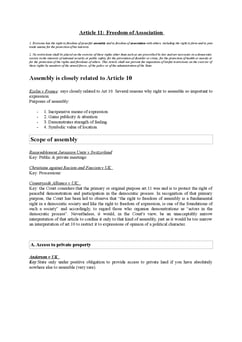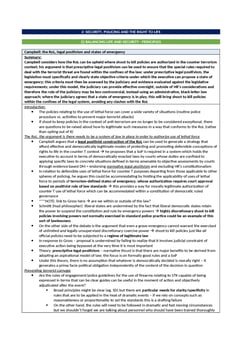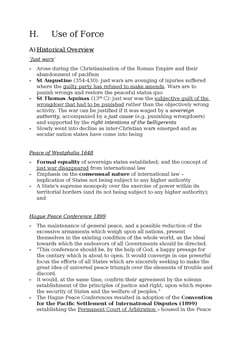Hirst v The United Kingdom (No. 2) [2005] ECHR 681; [2005] 10 WLUK 84; [2006] 42 EHRR 41
Judgement for the case Hirst v The United Kingdom (No. 2)
Table Of Contents
KEY POINTS
-
Freedom of expression is a cornerstone of democracy, allowing individuals to voice their opinions without interference.
Human rights form the foundation of just and equitable societies, safeguarding dignity and equality.
Just satisfaction compensates for rights violations, promoting accountability.
-
Legitimate aim permits restrictions on rights for societal goals, balancing individual freedoms.
The margin of appreciation grants flexibility in applying human rights, considering diverse contexts.
Positive obligations compel states to protect and realize human rights actively.
-
Prisoners' rights emphasize humane treatment and rehabilitation.
Proportionality ensures restrictions on rights are necessary and reasonable.
The right to vote is fundamental for democratic governance, enabling political participation and representation.
FACTS
-
On February 11, 1980, Hirst ("Applicant") entered a guilty plea for the charge of manslaughter, leading to his sentencing to discretionary life imprisonment.
As a consequence of this conviction, he became subject to legislation that imposed restrictions on the voting rights of convicted prisoners across various categories.
-
The Applicant, invoking Article 3 of Protocol No.1, raised a complaint asserting that the disenfranchisement resulting from his conviction violated his rights.
He contended that the denial of voting rights constituted a breach of the aforementioned article.
Also under Article 14, the Applicant alleged discrimination as a convicted prisoner.
He argued that the differential treatment he faced, stemming from his criminal status, amounted to a violation of his rights as guaranteed by this article.
The Applicant invoked Article 10, claiming that his freedom of expression had been impeded by the legal provisions restricting the rights of convicted prisoners, thereby asserting a violation of his right to freely express himself.
The applicant sought just satisfaction under Article 41, seeking appropriate remedies for the alleged violations of his rights under the European Convention on Human Rights.
JUDGEMENT
By a majority of 12 to 5, the Court found a violation of Art.3 of Protocol No.1, ruling that the UK's automatic and indiscriminate restriction on prisoners' voting rights fell outside the permissible margin of appreciation.
No separate issue arose under Art.14, and Article 3 of Protocol No.1 was considered a lex specialis regarding the right to vote (Art.10).
Having received legal aid for domestic proceedings, the Applicant couldn't recover those costs.
The Court awarded €23,200 for Grand Chamber proceedings and set default interest based on the ECB's lending rate plus 3 percentage points.
COMMENTARY
The court had a dissenting opinion in the case of Hirst v. United Kingdom, focusing on the issue of prisoners' voting rights.
-
The judges expressed disagreement with the majority's finding of a violation of Article 3 of Protocol No. 1, arguing that the blanket restriction on prisoners' voting rights is not inherently illegitimate.
They emphasized the wide margin of appreciation for states in shaping their electoral systems and highlighted the lack of a clear basis for an absolute right to vote for prisoners in the Convention.
The dissenting judges raised concerns about the majority's approach, suggesting that it might restrict states' discretion in defining their electoral laws. They contended that the majority fails to provide clear guidance on a suitable resolution, leaving states in a legislative quandary.
The case reflects a nuanced legal discussion around the intersection of human rights, democratic principles, and states' discretion in determining voting rights for prisoners.
For Further Study on Hirst v The United Kingdom (No. 2)

European Human Rights law notes fully updated for recent exams at Ox...
Need instant answers? Our AI exam tutor is here to help.
Ask questions 🙋 Get answers 📔 It's simple 👁️👄👁️
Our AI is educated by the highest scoring students across all subjects and schools. Join hundreds of your peers today.
Get StartedSimilar Cases
Related Product Samples
These product samples contain the same concepts we cover in this case.


